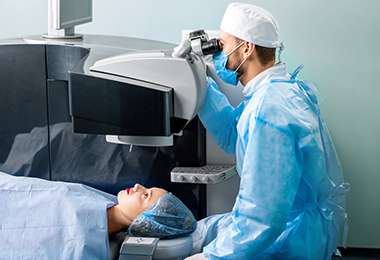
At Piedmont Eye Associates in Spartanburg, SC, patients are welcomed into an environment where treatment centers around the patient. Education and high-quality service is placed above anything else at our practice. We go beyond the expected level of care and provide more than our patients could have imagined, especially when it comes to cataract care.
Generally, the lens of the eye is meant to be clear. However, those who have cataracts have a clouding over the lens. Someone who has cataracts will see everything as though it’s through a foggy window. Clouded vision affects a person’s ability to read and drive a car, especially at night. In the early stages, cataracts won’t harm a person’s vision. They tend to develop slowly.
Clouded, blurred or dim vision is one of the most common symptoms of cataracts. A person with cataracts will experience difficulty seeing at night, which progressively gets worse over time. Cataracts can cause a sensitivity to light. Sometimes, it looks as though objects are glared when the lighting in the room is bright. Someone with cataracts may need to have brighter lights for reading. Seeing “halos” around lights is a common occurrence. Additionally, someone with cataracts may have frequent changes in vision and have double vision in one eye.
The two main culprits of cataracts are age and injury. People with certain inherited disorders are more at risk for cataracts. Diabetes, the long-term use of steroids, and previous eye surgeries can cause cataracts as well. The lens, which is located behind the iris, focuses light, so images appear sharp. Age contributes to the lens becoming less transparent and less flexible as well as thicker. Age and other medical conditions cause the tissue inside of the lens to break down and form together, which clouds small portions of the lens. As cataracts worsen, the clouding affects a larger portion of the lens and becomes denser. Cataracts tend to develop it both eyes, but don’t usually progress at the same pace.
In the early stages, it’s possible that brighter lights and eyeglasses will correct the problem. As the problem worsens, glasses might no longer be enough to correct the problem. In this case, surgery is the only option that will help.
Surgery consists of removing the clouded area of the lens and replacing it with an artificial lens to restore visual clarity. The artificial lens takes the place as the natural lens to become a permanent part of the eye. Not everyone is able to use an artificial lens, though. In these cases, the cataract is removed, and the vision is correct via contact lenses or eyeglasses.
Cataract removal surgery is generally done on an outpatient basis, meaning the patient doesn’t have to stay in the hospital after the surgery. The patient is usually given topical eye drops to numb the eye and in rare cases a local may be needed to numb the area around the eye. The person remains awake for the procedure. The surgery is relatively safe. It does put the person at risk of infection or bleeding post-op. The surgery increases the patient’s risk of the retina detaching. Some discomfort is to be expected in the first few days, but the patient usually heals completely within eight weeks.
To ask questions about cataracts or schedule an appointment with Piedmont Eye Associates, contact us at 704-926-3937.
Dr Berry is the best. He is so thorough.